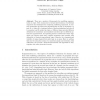Free Online Productivity Tools
i2Speak
i2Symbol
i2OCR
iTex2Img
iWeb2Print
iWeb2Shot
i2Type
iPdf2Split
iPdf2Merge
i2Bopomofo
i2Arabic
i2Style
i2Image
i2PDF
iLatex2Rtf
Sci2ools
118
click to vote
ECSQARU
2009
Springer
2009
Springer
An Algorithm for Generating Arguments in Classical Predicate Logic
Abstract. There are a number of frameworks for modelling argumentation in logic. They incorporate a formal representation of individual arguments and techniques for comparing conflicting arguments. A common assumption for logic-based argumentation is that an argument is a pair Φ, α where Φ is a minimal subset of the knowledgebase such that Φ is consistent and Φ entails the claim α. Different logics provide different definitions for consistency and entailment and hence give us different options for argumentation. An appealing option is classical first-order logic which can express much more complex knowledge than possible with defeasible or classical propositional logics. However the computational viability of using classical first-order logic is an issue. Here we address this issue by using the notion of a connection graph and resolution with unification. We provide a theoretical framework and algorithm for this, together with some theoretical results.
Argumentation | Artificial Intelligence | Classical Propositional Logics | Classical first-order Logic | ECSQARU 2009 |
Related Content
| Added | 26 May 2010 |
| Updated | 26 May 2010 |
| Type | Conference |
| Year | 2009 |
| Where | ECSQARU |
| Authors | Vasiliki Efstathiou, Anthony Hunter |
Comments (0)

